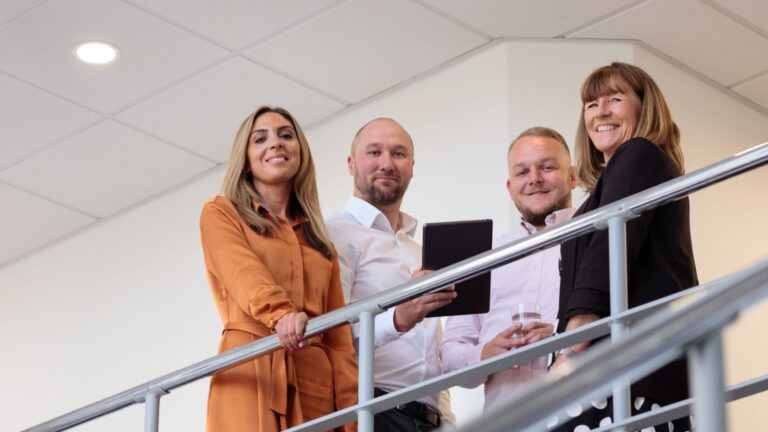
A little over 3 years ago, we spoke with Miriam James, Managing Director of Silvey Fleet, to hear about the evolution of the business, from bulk fuel provider to fleet solutions provider under the Silvey Fleet brand. We recently had the opportunity to catch up again, when Margaret Major met with Miriam to hear how the company continues to evolve its solutions to support customers through the transition, positioning itself perfectly for ambitious future plans.
Miriam begins by explaining how her own role has changed since our previous conversation: “I took responsibility for the Onroute business in November last year, with Silvey Fleet and Onroute now integrated under Commercial Road Transport (CRT) – an international business unit of Mabanaft Group.
“Rather than operating by geographical regions, we are more focused on business activity and leveraging group synergies to further strengthen and expand our end-customer business.
“Our strategy, both as a group and as the Silvey Fleet and Onroute businesses, is to invest in the right areas and assets, bring in the best talent and expand our portfolio to continue to meet our customers’ future energy needs.”
Supporting customers through the energy transition
“We are fully committed to supporting our customers through the transition.
“When we talk to our customers, we find many are aware of the need to consider their transition, especially as supply chain demands and the requirement for businesses of a certain size to publish their emissions, increase the pressure to do so, but some customers don’t know which way to go.
“For us, it’s about working with our customers, as they consider what the transition looks like for them, to find the right solutions and ensure that we can provide those solutions into the future. It’s about considering the pain points of today, but also future ones and providing solutions.
“Whatever those solutions are, we will provide what the customer requires, and agility is key to achieving this. We service our customers today with the future in mind, and can’t be precious about specific solutions. We try to plan for eventualities and manoeuvre as needed.
“In terms of our truckstop sites, we plan to offer multi purpose solutions, including hydrogen and liquid biofuels (Renewable Diesel, HVO) and EV charging. We now have Renewable Diesel, HVO at all our sites, and believe it has a major role to play in the transition.
Our customer conversations around HVO are driven by their green agenda, and more needs to be done to raise awareness of the benefits of HVO.”
Do you think the government should do more to force the direction of travel or is it right that the market decides?
“It’s government, it’s vehicle manufacturers – there are so many influences involved – but if the pathway and legislation were clearer, it would make investment decisions easier.
“This is why HVO needs far more publicity, promotion and endorsement. The industry has done an excellent job with members, customers and lobbying, but there needs to be much more noise around the benefits of switching and the strength of HVO as a transitional solution that doesn’t require a change of vehicle to deliver emission reduction.”
Carbon offsetting
“My role is very focused on mobility and roadside fuelling, and delivering more decarbonised solutions for that but, for our customers, the need to decarbonise is, often, a much broader issue than just the carbon footprint of their roadside refuelling. To address these broader needs, we offer a carbon offsetting solution.
“Rapid action is required to halve global emissions in the next decade, and reach net zero emissions by 2050. There may, for example, be customers who want to transition to an electric fleet but, since carbon-free electricity is not yet 100% possible, they also want to offset the remainder of their emissions. Or it may only be possible to migrate part of their fleet to a low carbon solution, so they can use carbon offsetting on a transitional basis to demonstrate their willingness while more complete carbon removal solutions are implemented.
“It is a pragmatic solution to address emissions that cannot be otherwise eliminated but need to be correctly declared.
“What is important is that businesses consider their environmental credentials – in exactly the same way as they would consider data security, for example. It is simply good business practice.
“The decision to take action depends very much on the attitude of the business. As a business, we haven’t waited for changes such as emission reporting etc. to become a requirement, instead, we have implemented change where we have seen a compelling reason to do so and a clear business benefit.”
Standards that stand out
A good example of Silvey Fleet taking action to deliver a better business is the company’s commitment to Investors in People which, Miriam explains, is about “our desire to do more than ‘just the basics’”.
“We want to be the best employer,” Miriam continues, “and what that looks like is not determined by me. We are extremely proud of the award of a Platinum ‘We Invest in People’ accreditation to Silvey Fleet – something only 2% of assessed organisations ever achieve.
“Investors in People believes that the success of an organisation begins and ends with people. We firmly share this belief and are dedicated to further development of all areas of our business, making Silvey Fleet a great place to work for our people and the supplier of choice for the many businesses we support.
“Finding good quality, talented recruits, will always be a challenge, but we know that our commitment to Investors in People, putting our people first and living our core values, supports us in attracting the right recruits. It gives the younger generations something to benchmark us against externally.
“We also launched a graduate programme last year. With apprenticeships in most of the commercial areas of the business we have a focus on delivering a progression path. That may be within our own businesses, such as Silvey Fleet and Onroute, but we are also able to leverage the wider group to deliver that clear progression plan.
“It is essential not to stall anyone’s development, we strongly believe in continually developing people’s skill sets, so they remain fully engaged.
“If we look after employees, they will look after our customers.”
High standards
This culture of continuous improvement runs throughout Silvey Fleet as Miriam explains: “As a service provider, we are constantly seeking to improve the way we work with, and what we deliver to, our customers. Change is viewed as ‘the norm’, allowing the business to grow and we continue to develop the fleet management solutions we offer.
“Delivery of the Investors in People accreditation is not the only standard we hold ourselves up to. We also have ISO 27001 – information security, ISO 40001 – environmental, and ISO 9001 – quality. We have delivered all these because we believe they are important to the business and create a culture of continuous improvement.
“The culture aligns everyone in the company behind a common purpose – to create a stand-out business that our team, customers, group and community are all proud to be a part of. Our people work together to develop ideas that have positive outcomes for the business, often resulting in excellent developments to our products and services.”
Mobility payment solutions – the future for fuel cards
“A good example of this successful collaboration has been the development of our Miles Monitor fleet management app. Miles Monitor gives our customers a complete overview of their fleet expenses and operational workings, enabling them to see where they can make cost savings and improve efficiency.”
The focus on delivering the highest quality service and the right customer solutions also extends to the Silvey Fleet fuel card offering as Miriam elaborates: “We take time to understand each individual business, looking at route usage and closest fuel stations for example, so the specific solution offers the greatest convenience and best savings.
“We now refer to ‘fuel cards’ as mobility payment solutions, since it will not remain fuel in all cases. It is no longer about providing the product, it is about providing the broader solution and acting in a more consultative role to deliver an excellent customer journey. Convenience is key for the end user and, for us, it is about overcoming the pain points.
“With the potential to switch to transitional products, the account management side is becoming far more important as we work with the fleet manager to consider the most viable future solutions.
“There is a wide customer audience out there and a significant gap in the market and we believe we can add value to the customer. It’s a big opportunity. It would be very easy to focus on our own business objectives, but we start with the customer in mind and, when we get it right for them, it works for our business too.”
Achieving growth in times of change
With Miriam’s clear enthusiasm to deliver Silvey Fleet bespoke solutions within the traditional fuel cards sector, I asked about other opportunities the changing energy scenario presents to the business.
“We have ambitious expansion plans. We went live in Ireland on the Silvey Fleet side two years ago, and we will be expanding into other regions in Europe as well as accelerating growth in the UK. This will be through a combination of organic growth and by increasing resources on the sales and marketing side.”
And what about Onroute – is there opportunity there for additional sites or acquisition from other providers?
“To meet our customers’ transitioning needs, we need to deliver multi-purpose hubs for the future, so we look to locations where we can supply liquid fuels, electric, hydrogen etc.
“When we talk about expansion and, for example, Silvey Fleet, it is not brand specific, it is an expansion to the Commercial Road Transport division, ensuring it has strategically placed sites with all of the services for both domestic and international customers along with supporting mobility payment solutions.”
What does the future look like?
“We want to be the best fleet management solution provider and to continue to expand our customer base by challenging the status quo and embracing the opportunity that change presents.
“We will continue to evolve our fleet management solutions to meet the changing needs of our customers, and this is the key to our success – our focus on the customer and the customers’ needs – both today and into the future.
Images provided by Silvey Fleet
